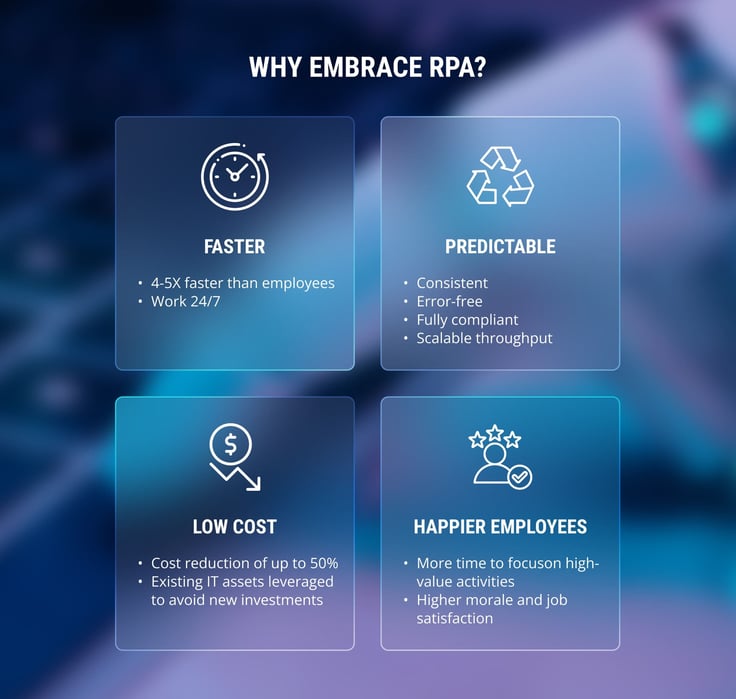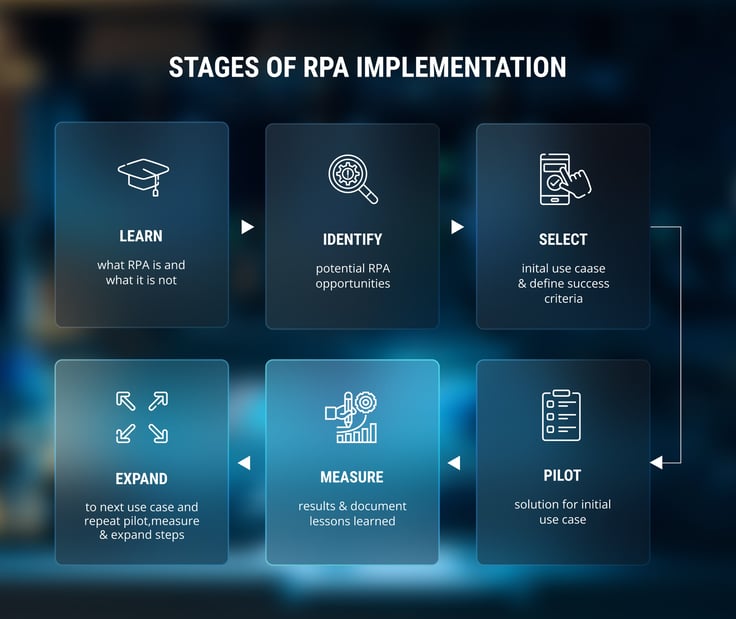Robotic Process Automation (RPA) is a technology that automates repeatable and rule-based tasks, increasing efficiency and allowing your employees to focus on strategic objectives. Through this blog post, we'll reveal the power of RPA and show you how LeverX can help you unlock its full potential in your organization.
Does your business suffer from excessive time and resource waste? Are manual, rule-based processes taking up valuable hours that could be spent on activities that add more value? This lack of efficiency can significantly impact an organization's success in the current corporate landscape. But what if there was a way to automate those tedious tasks?
Robotic Process Automation (RPA) offers the perfect solution to the problem. It's a technology that automates repeatable and rule-based tasks, increasing efficiency and allowing your employees to focus on strategic objectives. Through this blog post, we'll reveal the power of RPA and show you how LeverX can help you unlock its full potential in your organization. It's time to bid farewell to inefficiencies and start enjoying the rewards of improved productivity and growth.
Manual Labor vs. Robotic Processes: Benefits of Automation in Business
The advantages of RPA are multifaceted and far-reaching. Software robots can yield tangible and quantifiable gains in numerous aspects of a business, from customer experience and employee satisfaction to accelerated process speed, accuracy, and cost savings. Among the list of possible advantages of RPA are:
Efficiency and error reduction
RPA minimizes mistakes and inefficiencies associated with manual labor by using software bots to perform repetitive tasks accurately and swiftly. This maximizes efficiency and ensures consistent implementation of duties, reducing errors.
Cost-savings
RPA reduces labor expenses by automating repetitive tasks, eliminating the need for additional staff and training. This results in significant cost savings and enhances the organization's fiscal effectiveness.
Adaptability to changing demands
RPA offers scalability, allowing organizations to adapt quickly to changing operational requirements. It handles higher transaction volumes and adjusts to new business procedures, ensuring operational proficiency during periods of growth or modification.
Maximum workforce potential
Automating tedious tasks with RPA allows employees to focus on more meaningful activities, improving job satisfaction and enabling them to contribute their skills to strategic initiatives. This leads to a more driven and passionate workforce pursuing more challenging roles.

From elevated efficiency and savings to scalability and improved employee gratification, RPA has the potential to alter business processes and drive success. Using software robots to automate repetitive duties, enterprises can refine their procedures, decrease errors, and acquire greater operational effectiveness. For businesses facing the digital era, RPA is a reliable tool to facilitate operations, bolster competitiveness, and create new opportunities for progress.
Exploring the Impact of RPA in Different Industries: A Comprehensive Look at Success Stories
RPA has emerged as a game-changer across various industries, revolutionizing businesses' operations and streamlining complex processes. By automating repetitive tasks, RPA has proven valuable, enabling organizations to boost efficiency, reduce costs, and improve overall productivity. Let's delve into some success stories that highlight the transformative power of RPA in different sectors.
Robotic Process Automation in the Automotive Industry
Industry-specific challenges:
- Complex inventory control
- Order fulfillment pressures
- Warranty management complexity
- Communication and collaboration gaps
How RPA addresses them:
The automobile industry has been invigorated by RPA. From streamlining supply chain supervision to reinforcing customer care, RPA has made a remarkable effect. Leading automotive producers such as Toyota, BMW, Ford, and General Motors have adopted bots to computerize inventory management, order fulfillment, and warranty resolution. Automating these operations has diminished errors, hastened response periods, and heightened customer satisfaction. RPA has also facilitated seamless coordination between various departments, stimulating collaboration that allows for more intelligent decision-making.
Robotic Process Automation in the Supply Chain Management
Industry-specific challenges:
- Complex inventory management
- Inefficient order fulfillment
- Lack of visibility in the supply chain
- Collaboration gaps
- Time-consuming manual processes
How RPA addresses them:
RPA has profoundly transformed Supply Chain Management (SCM) and is being adopted by giants such as Amazon, Walmart, Procter & Gamble, and FedEx. By automating the tracking, forecasting, and replenishment of inventory, RPA can ensure optimal stock levels and cost savings. It accelerates order fulfillment by automating order processing, packing, and shipping and reduces processing time while increasing accuracy. Additionally, RPA enhances supply chain visibility and collaboration by allowing real-time data integration and information sharing among systems and departments. RPA also eliminates manual processes and paperwork by automating tasks such as data entry, document processing, and reporting. Consequently, it streamlines SCM, increases efficiency, ensures fewer mistakes, and improves supply chain networks.
Robotic Process Automation in the Water Industry
Industry-specific challenges:
- Efficient water utility operations management
- Customer inquiry complexities
- Difficulties with infrastructure maintenance and resource allocation
How RPA addresses them:
Managing water utility operations efficiently can be challenging, but RPA has emerged as a transformative solution. Leading water utility companies such as AquaCorp, AquaTech, and WaterWorks have implemented RPA to automate meter reading, billing, and customer inquiries. The results have been remarkable, with faster billing cycles, improved accuracy in meter readings, and reduced customer complaints. Moreover, RPA enables proactive infrastructure maintenance by automating water quality monitoring, leak detection, and resource allocation. These benefits have increased operational efficiency and contributed to sustainable water management.
Robotic Process Automation in the Healthcare Industry
Industry-specific challenges:
- Tedious administrative tasks and time-consuming processes
- Data entry, claims processing, and appointment scheduling complexities
- Administrative burdens and the need for improved patient care
How RPA addresses them:
The healthcare industry faces significant challenges in administrative tasks, but RPA has made crucial strides in alleviating them. Healthcare providers such as Mayo Clinic, Cleveland Clinic, Kaiser Permanente, and Johns Hopkins Medicine have leveraged RPA to automate patient data entry, claims processing, and appointment scheduling. This automation has resulted in reduced administrative burdens, enhanced data accuracy, and improved patient care. RPA bots handle repetitive tasks precisely, allowing healthcare professionals to focus on critical and value-added activities. Furthermore, RPA facilitates seamless interoperability between different healthcare systems, enabling efficient sharing of patient information and fostering collaboration among healthcare professionals.
Robotic Process Automation in the Manufacturing Industry
Industry-specific challenges:
- Inefficiencies in inventory control, order fulfillment, and warranty handling
- Time and resource consumption due to repetitive tasks
- Communication gaps between departments
How RPA addresses them:
RPA has significantly improved the manufacturing industry. Renowned manufacturers like Tesla, Samsung, LG, Siemens, and Schneider Electric have embraced RPA bots to automate inventory management, order fulfillment, and warranty resolution. The results have been remarkable, with reduced errors, faster response times, and increased customer satisfaction. Moreover, RPA has facilitated seamless coordination between departments, fostering collaboration and enabling intelligent decision-making. By leveraging RPA, manufacturers have streamlined supply chain supervision and reinforced customer care, improving operational efficiency and optimizing outcomes.
Robotic Process Automation in the Banking Industry
Industry-specific challenges:
- Increased resource consumption due to manual tasks like data entry, customer onboarding, and compliance procedures
- Evolving regulations, customer expectations, and fierce competition
- Data sharing and collaboration difficulties across disparate banking systems
How RPA addresses them:
RPA has everything needed to effectively tackle these challenges, and here's how. Leading banks like JPMorgan Chase, Bank of America, Citigroup, and HSBC have wholeheartedly embraced RPA to automate manual and repetitive tasks. RPA bots efficiently handle data entry, document verification, compliance checks, and customer service inquiries. By leveraging RPA, banks have witnessed improved operational efficiency, reduced processing times, and enhanced workflow accuracy. Furthermore, RPA enables seamless integration between disparate banking systems, facilitating better data sharing and collaboration across different departments. With RPA's support, banks can focus on high-value tasks such as personalized customer interactions and strategic decision-making, ultimately driving customer satisfaction and fostering business growth.
How RPA Services in SAP BTP Can Transform Your Business
Building upon the robust foundation of the SAP Business Technology Platform (SAP BTP), RPA services, such as those offered by the SAP Build Process Automation service, provide the transformative potential for your business. By combining the power of RPA with the comprehensive capabilities of SAP BTP, you can unlock new levels of efficiency, productivity, and innovation.
SAP BTP encompasses a diverse portfolio of SAP products, services, and solutions, providing a unified platform for your RPA initiatives, including the SAP Build Process Automation service tailored explicitly for RPA implementation and management. With this service, you gain a dedicated toolset to design, deploy, and manage your robotic process automation workflows, enabling you to effectively automate complex business processes.
Boost your operational efficiency through seamless integration capabilities
One key advantage of SAP BTP is its seamless integration with SAP systems. This integration allows for a smooth and efficient connection between your organization's RPA bots and various systems and applications. By leveraging integration capabilities, including those offered by the SAP Build Process Automation service, you can automate complex tasks, streamline workflows, and eliminate manual handoffs, enhancing operational efficiency and reducing errors.
Power your automation initiatives with greater control, visibility, and agility
The workflow and process management capabilities offered by SAP BTP and the SAP Build Process Automation service further strengthen your RPA implementation. From end-to-end automation to orchestration and monitoring, SAP BTP provides the necessary robotic process automation tools to optimize your business processes, including the SAP Build Process Automation service. You can achieve greater control, visibility, and agility in your automation initiatives, enabling you to adapt quickly to changing requirements and scale your RPA solutions as needed.
Unlock the power of data-driven insights to optimize and continuously improve your RPA efforts
With analytics and monitoring functionalities, SAP BTP and the SAP Build Process Automation service enable you to gain valuable insights into the performance of your RPA processes. By leveraging these insights, you can identify bottlenecks, optimize resource allocation, and continuously improve your automation efforts. The combination of RPA and analytics empowers you to make data-driven decisions, drive continuous improvement, and maximize the value delivered by your RPA solutions.
Harness the power of ML and AI in business to automate complex and repetitive tasks
Intelligent technologies like AI and ML are embedded within SAP BTP, enriching your RPA capabilities. SAP solutions like SAP Intelligent RPA leverage these intelligent technologies to automate complex and repetitive decisions. You can automate tasks requiring cognitive capabilities by leveraging AI and ML algorithms, freeing your workforce to focus on more strategic and innovative initiatives.
Leverage cloud infrastructure for reliable and flexible RPA solutions
The secure and scalable cloud infrastructure of SAP BTP ensures the reliability and flexibility of your RPA solutions, including those powered by the SAP Build Process Automation service. With built-in security measures and robust data protection, SAP BTP provides a trusted environment for your automation initiatives. Additionally, the scalability of the cloud infrastructure allows you to expand and adapt your RPA services, leveraging the capabilities of the SAP Build Process Automation service as your business evolves, ensuring long-term success and growth.
At LeverX, we specialize in helping enterprises navigate the RPA and SAP BTP world. Our experienced team can guide you through every stage of RPA implementation, from strategy and assessment to development and support.

The Bottom Line
With SAP BTP's extensive capabilities and LeverX's expertise in robotic process automation services, you can embark on a successful RPA journey and reap the rewards of improved productivity and competitiveness in today's digital landscape.
We offer tailored solutions that align with your unique business needs, leveraging the power of SAP BTP and RPA to deliver tangible results. Contact us today to learn more about our RPA services and how we can assist your organization.
How useful was this article?
Thanks for your feedback!



